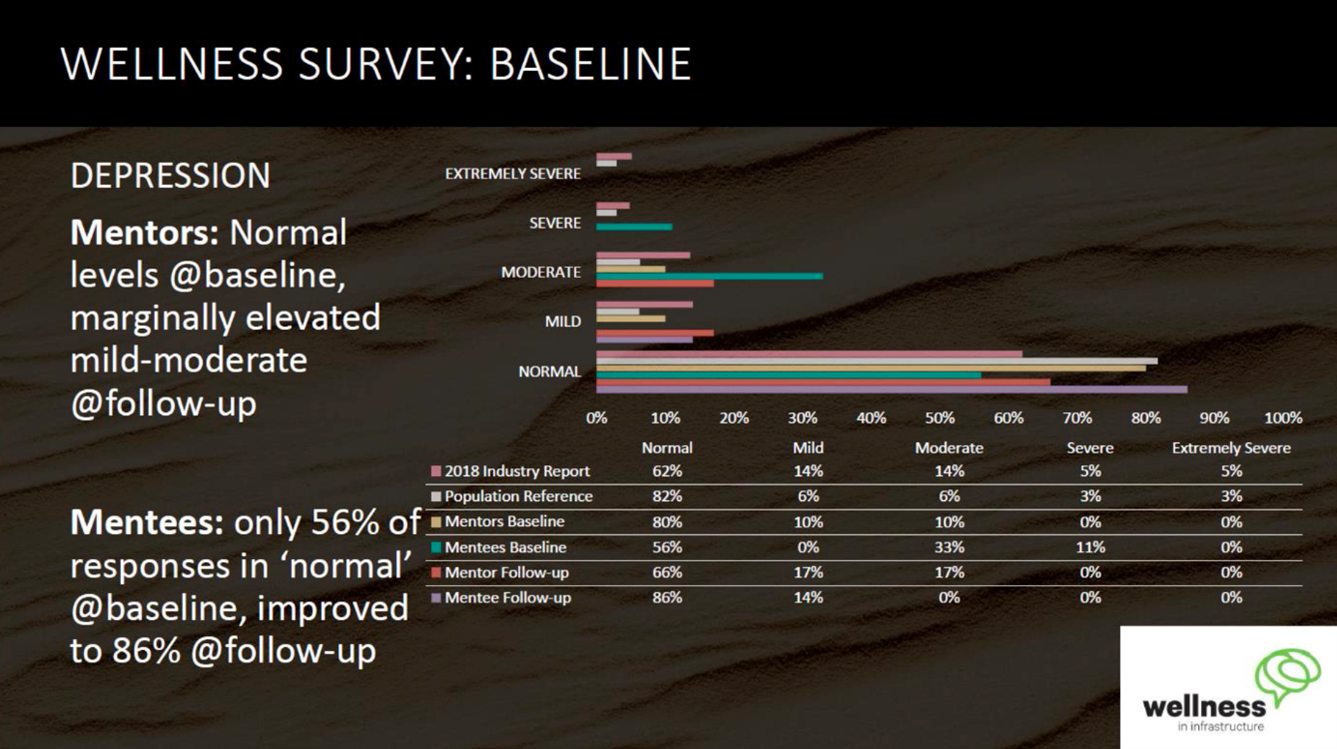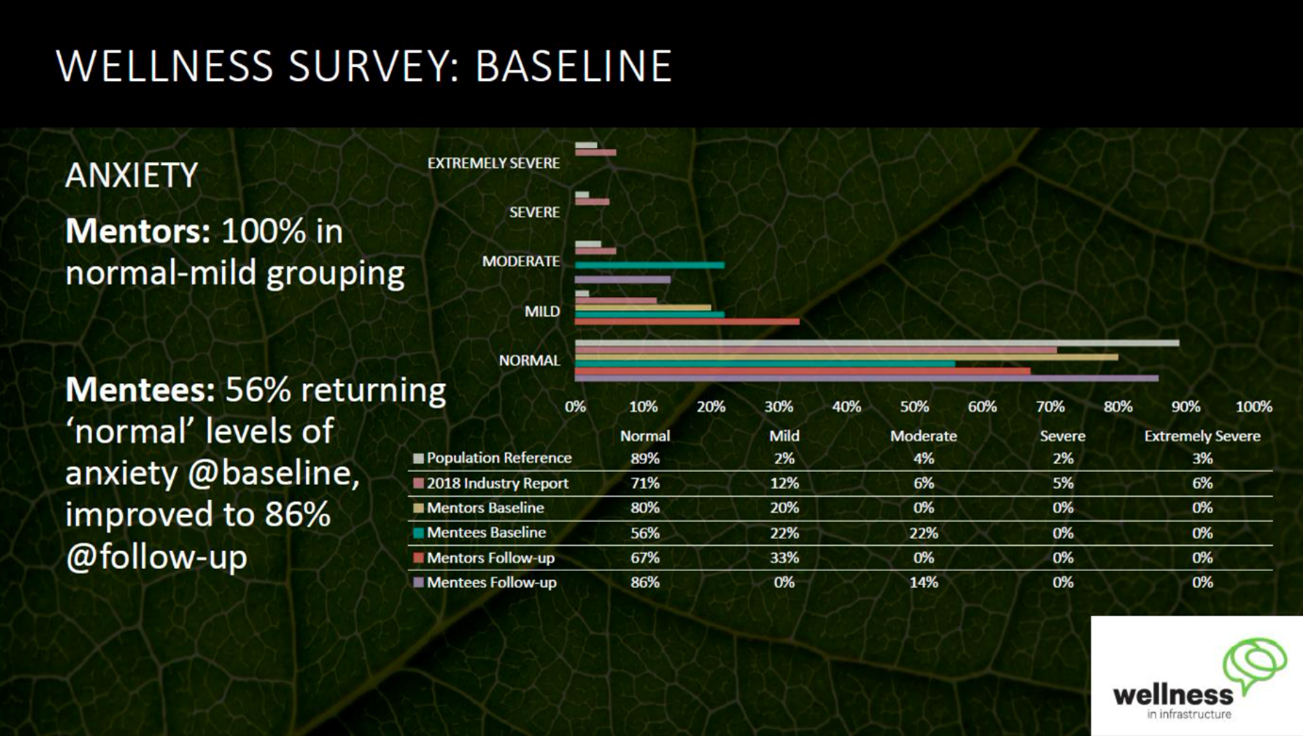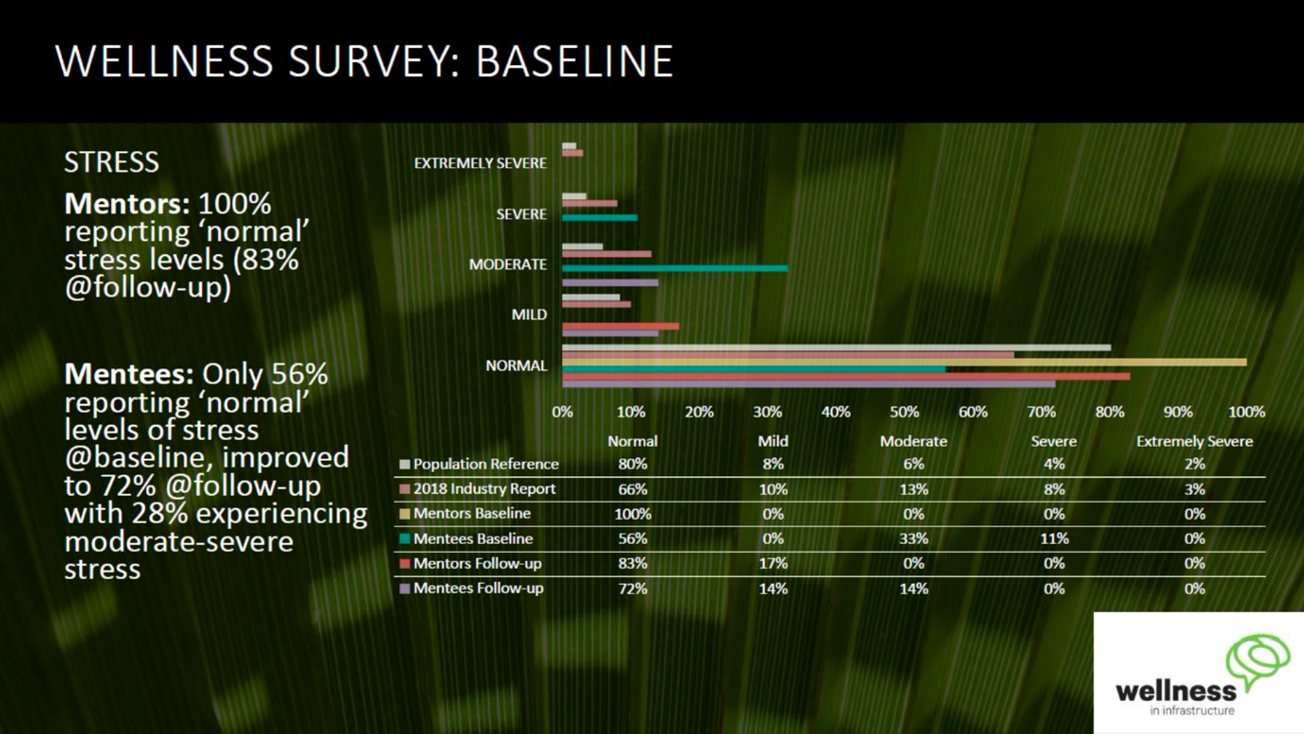Building Resilience: A Collaborative Journey Towards Mental Health Transformation in Construction
Stress gap significantly reduced from 64% to 22% through building resilience.
In the demanding landscape of the construction industry, the toll on mental health has been a longstanding concern. In a groundbreaking initiative, industry leaders Lysander, John Holland, and Wellness in Infrastructure have jointly pioneered a pilot mentoring program designed to significantly alleviate mental health issues and stress within the construction workforce.
The Mentoring Program
Commencing in February 2023, this industry-led program brought together a cohort of 10 experienced industry leaders (mentors) paired with 10 emerging leaders (mentees), all dedicated to the shared goal of building resilience and addressing systemic issues contributing to mental health challenges in the sector. The program focused on six key factors affecting mental health in the construction industry: pressure, influence, promotion, relationships, role, and change. Emotional intelligence and well-being assessments were conducted at the program's commencement and completion.
Positive Outcomes
The mentees showcased substantial improvement in mental health scores, with 86% reporting 'normal' levels for depression and anxiety at the program's conclusion, compared to 56% at the start.
Similarly, 72% reported normal stress levels, compared to 56% initially. Noteworthy improvements were observed in strategic thinking, communication skills, and confidence in professional relationships. Mentees exhibited a 34% increase in listening skills, 25% in building trust, and a 29% increase in goal identification.



Balancing Work-Life and Resilience
Navigating the delicate equilibrium between work and life proved to be a nuanced challenge for mentees, with a marginal uptick in dissatisfaction stemming from extended working hours. However, this perceived setback was effectively counteracted by a significant enhancement in overall resilience fostered by the program. The strategic focus on resilience emerged as a crucial mitigating factor, providing mentees with a robust toolkit to navigate heightened work pressures.
“This program underscores that investing in the mental health of professionals is not just a social responsibility, it’s a strategic imperative.””
This bolstered resilience not only served as a protective buffer against the strains induced by extended hours but also became a catalyst for positive and adaptive responses. Mentees, armed with an increased capacity to manage stressors, transformed challenges into opportunities for growth. This dynamic interaction between work-life dynamics and resilience exemplifies the program's holistic approach, strategically fortifying participants and contributing to a sustainable improvement in their overall personal and professional effectiveness.
Impact on Mentors
The mentorship program yielded notable advancements in mentoring skills among experienced industry leaders. As mentors navigated the program's intricacies, their ability to inspire others witnessed a substantial surge, marking a 38% increase. Furthermore, their prowess in developing the next generation of industry professionals showed a commendable uptick with a 25% boost. Not to be overlooked, mentors exhibited a noteworthy 27% enhancement in their listening skills.
These improvements signify a profound evolution in mentors' capacities, underlining their dedication to cultivating a supportive and developmental environment within the construction industry. The heightened skills in inspiration, development, and active listening underscore not only the program's immediate impact but also its enduring influence on shaping effective mentorship within the sector. As mentors honed these crucial skills, they not only enriched their own professional acumen but also contributed significantly to the program's overarching goal of fostering a resilient and adept workforce in the construction domain.
Shaping Mental Health Perspectives
Kerrie Adaway, CEO of Lysander, emphasises, "Investing in mental health is not just a social responsibility; it's a strategic imperative." This approach fosters a workplace culture that encourages open dialogue, reducing stigma and creating an environment where employees feel valued, supported, and empowered.
Emily Trevaskis, Chairperson of Wellness in Infrastructure, asserts that the mentoring partnership signals a paradigm shift in the industry's approach to mental health. Positive change is achievable through collaboration, and addressing mental health is not just a moral obligation but a pathway to a stronger, more prosperous industry.
Martin Smith, Group General Manager at John Holland, expresses pride in contributing to the program's success. He highlights the profound outcomes of emotional intelligence mentoring, demonstrating positive shifts in workplace dynamics. The mentees are now positioned to influence their workplaces and the broader industry positively.
Key Insights and Transformative Impacts
As this groundbreaking initiative concludes, key insights and transformative impacts emerge, reshaping the landscape of mental health within the construction industry. The substantial reduction in the stress gap from 64% to 22% underscores the program's efficacy in building resilience among industry professionals. Unanticipated enhancements in mentees' general mental health scores, coupled with improvements in strategic thinking and communication skills, signal a broader positive shift.
The intricate interplay between work-life balance and resilience becomes apparent, showcasing that despite increased working hours, improved resilience equips mentees to navigate stress more effectively. The outcomes extend beyond individual well-being, highlighting the potential for these individuals to positively influence their workplaces and the broader industry.
Mentors, too, experience notable growth, with marked improvements in mentoring skills, reinforcing the program's holistic impact. The collaborative efforts of Lysander, John Holland, and Wellness in Infrastructure manifest not only as a commitment to industry well-being but as a strategic imperative, positioning mental health at the forefront of industry priorities. This initiative serves as a beacon, illuminating a path towards a resilient, adaptive, and mentally healthy construction sector.
Curious to explore how building resilience, impactful mentoring, and fostering psychological safety can transform your workplace? At Lysander, we believe in sharing insights and strategies to enhance the well-being of your team. Reach out to us today, and let's embark on a journey toward a mentally healthier and more resilient workplace.

